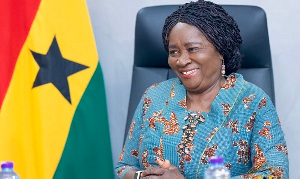28.12.10
Oko Sankah
In these days of WikiLeaks, where the most classified information under the protection of the most sophisticated security systems are leaking all over the world like a typical Ghana Water underground pipe at Chorkor, everyone needs to be careful what they do, say or even think, because now no one’s secret is safe, not even in one’s own bedroom.
One of the industries where secrecy and under-cutting are actually cherished commodities is the telecom industry; and rightly so, particularly in a country like Ghana where six multinationals are competing for 24 million people.
Indeed some of them have restraining clauses in their employment terms to prevent staff members who resign from working with a competitor until after one year; all that is to protect business secrets and poaching of clients.
But that is funny because most of the information leaking within the industry are actually from staff members within, sometimes even from top management people.
On any given day, the telecom operators compete against each other more than they collaborate with each other, and sometimes the battle gets very fierce, dirty, vicious, and petty too, but not much of it comes public.
But like the minority and majority in Parliament, when it suits them, they join forces to fight a common course. For instance, the telecom operators have constituted themselves into the Ghana Telecoms Chamber (GTC) and they are waging a fierce war against government for monitoring and taxing incoming international calls.
What some of the members of the Chamber do not know is that at least one member is secretly sabotaging the group because it is looking for favours from the telecom regulator to either have a monopoly or majority share of telecom opportunities in Ghana’s emerging oil industry, “WakiLeaks” can confirm.
This company, with a ‘T’ in their name according to deep throat information, secretly supports government monitoring and levying of incoming international calls in exchange for those favours; but they are pretending to be supporting the GTC because it is convenient to be seen to belong to the fraternity.
WakiLeaks can also confirm that the only one telecom operator (X), which does not have International Gateway, depends on two other operator to route international calls, but what those operators do is that they route all of operator X’s international calls through voice over internet protocol (VOIP), which is poor in voice quality. That way, they give operator X’s customers bad quality service, charge operator X international call fees for their service, but they actually do not lose anything because, by using VOIP, they swerve the tax master.
In fact long before WikiLeaks, this country was rocked with the leakage of emails between a media house and two telecom operators. One big broadcaster had sent an email to one telecom operator promising to use his ‘power’ on radio to make a ‘spectacular failure’ of their competitors, and promote that telecom operator. The email leaked to one of the operators and eventually the broadcaster had to resign and move on to other things.
Recently too there has been another leakage of email conversation between two top executives of one of the telecom giants in the country, with a “T” in their name. The conversation was vicious, full of attacks, insinuations and power-play between the two female top telecom executives.
Those were verifiable facts with documental proof. But there are several allegations of email monitoring and leakage between operators and sometimes even regulators. Some of the operators have had cause to believe that either external or internal forces have been leaking business secrets to competition. There have been a number of offers and promotions that one operator plans and the next moment, another operator is implementing it ahead of the originator.
But the battle gets more vicious than that sometimes. WakiLeaks can reveal, for example, that one operator, with a ‘T’ in their name, hired mercenaries to buy thousands of SIM cards from a another competitor also with a “T” in their name, and destroy them, so the operator whose cards were bought was under the impression they have sold so much cards but those cards never got activated. These are deep throat information from WakiLeaks.
The bottom line is that nothing any of the operators do remains a secret anymore. In fact it also appeared on the WakiLeaks radar that auditors’ reports showed that some of the top guys poached from one telecom operator by another had corruption hanging around their necks, and so for some of them, the move was necessary; and their respective managements let them go free because if they had been exposed, it would have affected some of those management people themselves.
The narrative, couched from a previous article titled “ethical notoriety, ethical controversy” is one more evidence of the fact that nothing goes hidden anymore, and even telephone calls are being monitored closely.
I hereby quote the writer of the article verbatim.
“Recently the Minister of Communications, Haruna Iddrisu announced on television that he had asked the National Communications Authority to probe the ‘text and win’ promotions, as well as the price war in the telecom sector.
I took that statement seriously and went scouting for reactions from the telecom operators in the country. Some of the operators gave quick responses to my questions but others, at least one, with a “T” in their name, brushed it off as “a statement made in passing” so they were not ready to comment.
But as a journalist, I ride on “statements made in passing” to write some of the big award winning articles that also address public interest.
In my bid to uphold the public interest, I went ahead with my story on the matter and quoted the responses of those telecom operators who cared to give them.
Days later, I got a call from “WakiLeaks” sources telling me one female telecom executive placed a call to the boss of a regulatory body and called me names because I had raised the issue about the minister’s plans to probe some activities of telecom operators.
The “WakiLeaks” sources told me that vicious female executive called me ‘notorious,’ ‘controversial,’ ‘unprofessional,’ among other very derogatory and despicable terms, all because I had asked a hard question.
I later did my own underground investigations and got a second witness to confirm that indeed that female telecom executive placed that call and said those words about me.
That telecom executive had staff members telling her that they saw the minister on TV saying exactly what I said, and yet that female executive insisted on running my hard-earned professional reputation in the mud to the boss of that regulatory body, for whatever reason, only God knows.
May I put it on record that, that female executive is being audited now and already evidence of deliberate over-payment and double payment to a particular organization have showed up, and yet she goes about behaving like some moral horse rider, assassinating the character of journalists. That was a bad move on her part and the consequences are inevitable.
I would recommend that you read the article with the title “ethical notoriety, ethical controversy” for the writers own comments on those vicious, petty and false charges.
Meanwhile, WakiLeaks has revealed that some PR agency has been presenting TV coverage budget to this female executive claiming that TV stations charge commercial rate for the coverage of corporate social responsibility (CSR) events. But recently one of the managers of one private TV station disclosed in a conversation that his station have never charged the company commercial rate for CSR, and challenged the PR agency to show proof of paying them commercial rate for CSR.
Meanwhile this female executive has been paying these monies to the PR agency, on top of their service fees, without asking questions, and even fights her own subordinates for asking the hard questions when it comes to that particular PR agency.
The point of this article is that the days of WikiLeaks are here, and whichever way one looks at it, one cannot hide and play vicious games against another and think that it will go unnoticed. It may not be WikiLeaks that leaks the information, but the culture of leakages is here with us. It may not be pleasant but it is helpful, because it helps innocent people to identify and protect themselves from the vicious, wicked, cunning and corrupt characters.
Long Live WikiLeaks, long live Asange, Long live WakiLeaks, and mercy for the souls of the vicious, wicked and corrupt.
ENDS
Opinions of Friday, 31 December 2010
Columnist: Sankah, Oko














